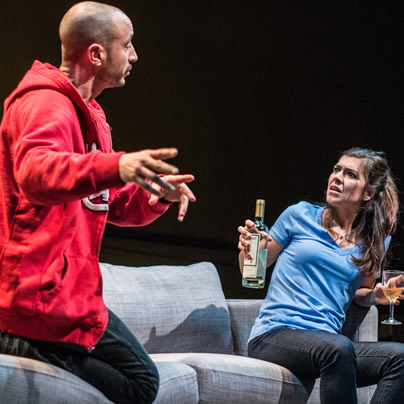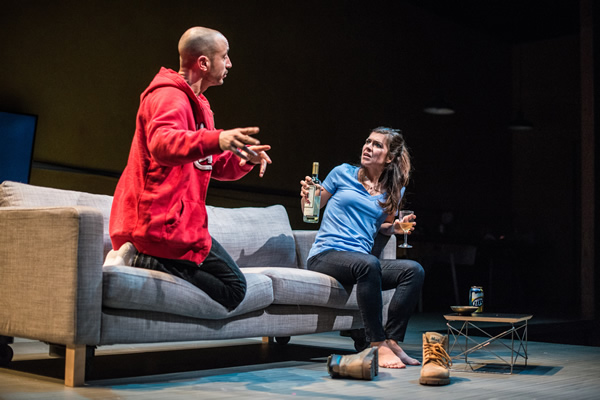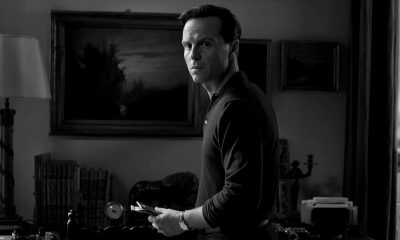Arts & Entertainment
Profane and profound
Studio’s ‘Hat’ a smart and beguiling character study


Drew Cortese, left, and Gabriela Fernandez-Coffey in Studio’s ‘The Motherfucker With the Hat.’ (Photo by Teddy Wolff; courtesy Studio)
‘The Motherfucker With the Hat’
Through March 10
Studio Theatre
1501 14th St. NW
$48-$72
202-332-3300
studiotheatre.org
“The Motherfucker with the Hat’s” catchy title is mild when compared to its dialogue. Yes, the characters in Stephen Adly Guirgis’ latest play like their language raw (don’t even try to count the f-bombs — you’d run out of fingers and toes within minutes) and very often hilarious. But there’s nothing stilted about what’s being said onstage. Guirgis faithfully channels the words of their world, allowing these hardcore New Yorkers to tell their stories in their own way and it couldn’t be more authentic.
Now playing at Studio Theatre, “Hat” kicks off with Veronica (Rosal Colón), a 30-ish Nuyorican spitfire talking on the phone with her mom while cleaning her grungy studio apartment and doing the occasional line of cocaine. Veronica advises her mother to drop her new no good man who has a head like fish, saying, “Take a moment. Take a breath. Take a real good look and just ax yourself in all honesty, ‘Do I wanna fuck him or fry him up with a little adobo and paprika?’” Instantly, we know this girl — not terribly eloquent, but makes her point, and her heart is in the right place.
Enter Veronica’s longtime boyfriend Jackie (the excellent Drew Cortese) bearing good news. A newly sober parolee who’s recently finished a two year stint upstate for dealing drugs, Jackie has just landed a job with UPS. But what was supposed to be a celebratory evening of Carvel ice cream cake, lovemaking and movies for the passionate couple goes awry when he spies an unfamiliar hat in the apartment — a dark fedora, plain except for a small fiery red feather on the side. He suspects infidelity. A huge fight ensues, and Jackie, unsure whether to seek wisdom at an A.A. meeting or revenge, storms out.
His support system — such as it is — consists of his best friend and AA sponsor Ralph (Quentin Maré), a charmingly slimy guru-wannabe who runs a successful health drink startup with his also sober but embittered wife Victoria (Gabriela Fernandez-Coffey). And while Ralph talks a lot of self-improvement, in his defense, he never claims to have anything to offer anyone other than sobriety. And then there’s Jackie’s seemingly gay cousin Julio (smartly underplayed Liche Ariza), a fastidious foodie/bodybuilder who’s married to a woman and harbors a secret passion for violence. Typically Jackie goes to him only when he needs something.
A wordy two hours without an intermission, “Hat” could potentially be tedious, but it’s not. Director Serge Seiden, who is gay, keeps things moving at a brisk clip. He also maintains an enviable balance of laughs and pathos. Debra Booth’s set is nicely subtle and serviceable — it works well, but never gets in the way. And the terrific five-person ensemble cast is especially strong. Each of the actors brilliantly embodies the play’s message: people aren’t always what they seem.
Without warning, Guirgis’ agile writing turns sharply from insults and slams to moments of stunning poignancy. When a drunken Jackie shows up at Veronica’s apartment eager to punish her for hurting him, she responds with her own hurt, reminding him of their shared dreams of children, a home in Yonkers, a future — all crushed by bad timing, poor decisions and drugs. Or when cousin Julio’s bouncy walk down memory lane morphs into an explanation of why he remains so very loyal to Jackie, citing a heartfelt memory from his early outcast adolescence when Jackie had his back. Heartbreaking moments.
A native of York City’s Upper West Side, the playwright is known for using the neighborhood’s urban mix in his work; and with “Hat,” an interesting cross section of these foul-mouthed, angry but hopeful, hurting and seriously funny folks are present and accounted for. They’re damaged people, in pain, masking hurt with bravado and humor, looking for love and trying to find their way.
“Hat” is a resonant play and Studio’s deeply affecting, always engaging production is alternately stinging and poignant.

Team DC, the umbrella organization for LGBTQ-friendly sports teams and leagues in the D.C. area, held its annual Night of Champions Awards Gala on Saturday, April 20 at the Hilton National Mall. The organization gave out scholarships to area LGBTQ student athletes as well as awards to the Different Drummers, Kelly Laczko of Duplex Diner, Stacy Smith of the Edmund Burke School, Bryan Frank of Triout, JC Adams of DCG Basketball and the DC Gay Flag Football League.
(Washington Blade photos by Michael Key)




















The 2024 National Cannabis Festival was held at the Fields at RFK Stadium on April 19-20.
(Washington Blade photos by Michael Key)
















Covering the @NatlCannaFest at RFK Stadium for @WashBlade . Stop by the LGBTQ+ booth and pick up a paper if you are here. pic.twitter.com/is7hnsaPns
— Michael Patrick Key (@MichaelKeyWB) April 20, 2024
Theater
‘Amm(i)gone’ explores family, queerness, and faith
A ‘fully autobiographical’ work from out artist Adil Mansoor

‘Amm(i)gone’
Thorough May 12
Woolly Mammoth Theatre
641 D St., N.W.
$60-$70
Woollymammoth.net
“Fully and utterly autobiographical.” That’s how Adil Mansoor describes “Amm(i)gone,” his one-man work currently playing at Woolly Mammoth Theatre.
Both created and performed by out artist Mansoor, it’s his story about inviting his Pakistani mother to translate Sophocles’s Greek tragedy “Antigone” into Urdu. Throughout the journey, there’s an exploration of family, queerness, and faith,as well as references to teachings from the Quran, and audio conversations with his Muslim mother.
Mansoor, 38, grew up in the suburbs of Chicago and is now based in Pittsburgh where he’s a busy theater maker. He’s also the founding member of Pittsburgh’s Hatch Arts Collective and the former artistic director of Dreams of Hope, an LGBTQ youth arts organization.
WASHINGTON BLADE: What spurred you to create “Amm(i)gone”?
ADIL MANSOOR: I was reading a translation of “Antigone” a few years back and found myself emotionally overwhelmed. A Theban princess buries her brother knowing it will cost her, her own life. It’s about a person for whom all aspirations are in the afterlife. And what does that do to the living when all of your hopes and dreams have to be reserved for the afterlife?
I found grant funding to pay my mom to do the translation. I wanted to engage in learning. I wanted to share theater but especially this ancient tragedy. My mother appreciated the characters were struggling between loving one another and their beliefs.
BLADE: Are you more director than actor?
MANSOOR: I’m primarily a director with an MFA in directing from Carnegie Mellon. I wrote, directed, and performed in this show, and had been working on it for four years. I’ve done different versions including Zoom. Woolly’s is a new production with the same team who’ve been involved since the beginning.
I love solo performance. I’ve produced and now teach solo performance and believe in its power. And I definitely lean toward “performance” and I haven’t “acted” since I was in college. I feel good on stage. I was a tour guide and do a lot of public speaking. I enjoy the attention.
BLADE: Describe your mom.
MANSOOR: My mom is a wonderfully devout Muslim, single mother, social worker who discovered my queerness on Google. And she prays for me.
She and I are similar, the way we look at things, the way we laugh. But different too. And those are among the questions I ask in this show. Our relationship is both beautiful and complicated.
BLADE: So, you weren’t exactly hiding your sexuality?
MANSOOR: In my mid-20s, I took time to talk with friends about our being queer with relation to our careers. My sexuality is essential to the work. As the artistic director at Dreams of Hope, part of the work was to model what it means to be public. If I’m in a room with queer and trans teenagers, part of what I’m doing is modeling queer adulthood. The way they see me in the world is part of what I’m putting out there. And I want that to be expansive and full.
So much of my work involves fundraising and being a face in schools. Being out is about making safe space for queer young folks.
BLADE: Have you encountered much Islamophobia?
MANSOOR: When 9/11 happened, I was a sophomore in high school, so yes. I faced a lot then and now. I’ve been egged on the street in the last four months. I see it in the classroom. It shows up in all sorts of ways.
BLADE: What prompted you to lead your creative life in Pittsburgh?
MANSOOR: I’ve been here for 14 years. I breathe with ease in Pittsburgh. The hills and the valleys and the rust of the city do something to me. It’s beautiful, it’ affordable, and there is support for local artists. There’s a lot of opportunity.
Still, the plan was to move to New York in September of 2020 but that was cancelled. Then the pandemic showed me that I could live in Pittsburgh and still have a nationally viable career.
BLADE: What are you trying to achieve with “Amm(i)gone”?
MANSOOR: What I’m sharing in the show is so very specific but I hear people from other backgrounds say I totally see my mom in that. My partner is Catholic and we share so much in relation to this.
I hope the work is embracing the fullness of queerness and how means so many things. And I hope the show makes audiences want to call their parents or squeeze their partners.
-

 South America4 days ago
South America4 days agoDaniel Zamudio murderer’s parole request denied
-

 Maryland4 days ago
Maryland4 days agoMontgomery County police chief discusses arrest of trans student charged with planned school shooting
-

 Commentary5 days ago
Commentary5 days agoWorld ‘isn’t much different today’
-

 Theater4 days ago
Theater4 days ago‘Amm(i)gone’ explores family, queerness, and faith












